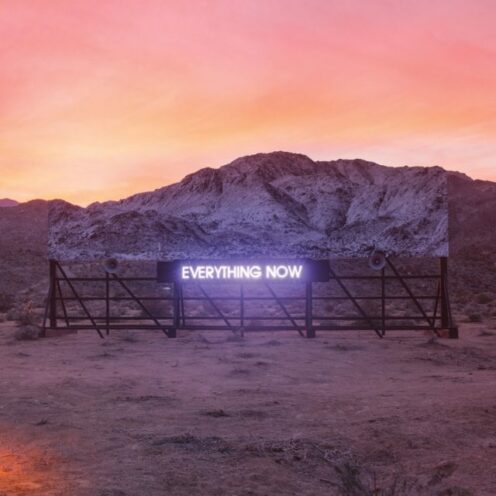
When Arcade Fire won the Album of the Year Grammy for The Suburbs, it felt like the beginning of something. Six years on from Funeral, the record that made the band torchbearers of the critically acclaimed indie rock scene, here they were, finally being recognized on the big stage. The records they beat—pop juggernauts from Katy Perry, Eminem, Lady Gaga, and Lady Antebellum—were all more indicative of what the radio sounded like in 2010. But Arcade Fire’s victory showed that, maybe, the pop world was finally ready to embrace something darker and more nuanced. Maybe they were ready to let a rock band back into the fold.
Looking back now, the Grammy win feels more like the end of something. Future Grammy winners didn’t sound or look much like Arcade Fire. Neither did radio stars. Instead, on 2013’s Reflektor, Arcade Fire started looking (and sounding) a lot like the pop insiders. Just like most of the other marquee acts that released albums that year—Daft Punk, Justin Timberlake (x2), Jay-Z, Eminem, Katy Perry, Lady Gaga—Arcade Fire made it clear that they were going for a capital-B Blockbuster. The rollout was excessive and overblown; the album was long and ambitious; the hype stretched on for months. And the songs…well, they didn’t have that much to offer, at the end of the deep, deep rabbit hole that Arcade Fire dug for fans. Writing for Grantland, Steven Hyden called 2013 “The Year Music Failed to Blockbust.” He wasn’t wrong, and Arcade Fire was at the center of it.
In this context, Everything Now, Arcade Fire’s fifth LP, actually feels kind of refreshing—at least in concept. Reflektor stank because the songcraft wasn’t strong enough to hold the weight of all the ambition, hype, and endless song lengths. Everything Now has a comparatively lightweight and almost tossed-off feel to it. The title track apes “Dancing Queen.” “Chemistry” apes “We Will Rock You” and “I Love Rock and Roll.” The two “Infinite Content” tracks sound like one of those YouTube stars who sarcastically tries to play the same song in as many different styles as possible—the first version a double-time punk run-through, the second a country-tinged R.E.M. number. After Reflektor, where Win Butler tried to address isolation and consumerism in the internet age (or something like that) by stealing Bono’s faux-ironic characters from the 1990s, these more playful influences and experiments are a breath of fresh air.
At least, they would be if the songs were any good. But somewhere along the way from that Grammy Album of Year win to today, Arcade Fire seem like they forgot how to write songs. Like Reflektor, most of these tracks don’t work as compelling individual works or as pieces of a larger whole. The difference is that Reflektor, for all its faults, still felt like an event. (And still had some gems: that album’s second disc, while jammed with songs that overstay their welcomes, is pretty solid.) Everything Now plays more like a B-sides record. There are a few worthwhile moments, but most of the runtime is devoted to songs that don’t go anywhere worth going. The brassy “Chemistry” is especially dire, to the point that it’s already been (rightfully) labeled as a low point in the band’s catalog. (To be fair, other first-half snoozers like “Signs of Life” and “Peter Pan” could be worthy nominees for the same title.)
Reflektor took Arcade Fire’s sound from sweeping indie rock to something more electronic and pop-focused. Everything Now pulls back on the electronic elements, but still feels more groove and beat-driven than the first three Arcade Fire LPs. That’s not a bad thing by itself: the bassline on “Good Goddamn” is an undeniable foot tapper, and “Creature Comfort,” the best song on the record, achieves what it does thanks largely to a relentless drumbeat and a slick synth groove. But what made Arcade Fire great on those first few records was their ability to capture communal emotion through big, open-hearted melodies. Hearing songs like “Wake Up” and “Keep the Car Running” was like singing along to Springsteen anthems at a live show: putting your arm around the stranger next to you, shouting yourself hoarse, and battling dual impulses to laugh and to cry. It was triumphant and heartbreaking at the same time, with a level of earnestness that tends to turn bands into punchlines (especially in our cynical modern age) but instead earned Arcade Fire a spot at the head of the indie rock table.
Everything Now never inspires that level of emotion. The singles get the closest: the big climactic “nah nah nah” section in the title track will probably play well in concert, while “Creature Comfort” is an energetic powder keg, a song that works despite Butler’s ham-fisted lyric about Funeral convincing a fan not to commit suicide. The slow and steady build of penultimate track “We Don’t Deserve Love,” is also beautiful, and is one of the few parts of the record that seems truly heartfelt. But most of Everything Now rests in the same slow-to-mid-tempo vein, with Butler’s voice rarely rising above his unremarkable mid-register. About half an hour through the record, you’ll probably wish that Butler would start bellowing and letting loose, the way he used to, but he never does. (Régine Chassagne, meanwhile, is limited to one lead vocal turn, on the acceptable but sleepy “Electric Blue.”) Robbed of those emotive moments that used to make Arcade Fire special, Everything Now is an exercise in waiting for a catharsis that never happens. Coming from a band that used to do catharsis better than just about anyone, that’s a massive letdown. It begs the question of how one of our generation’s most inspiring rock bands got roped into being one of its least compelling pop bands.